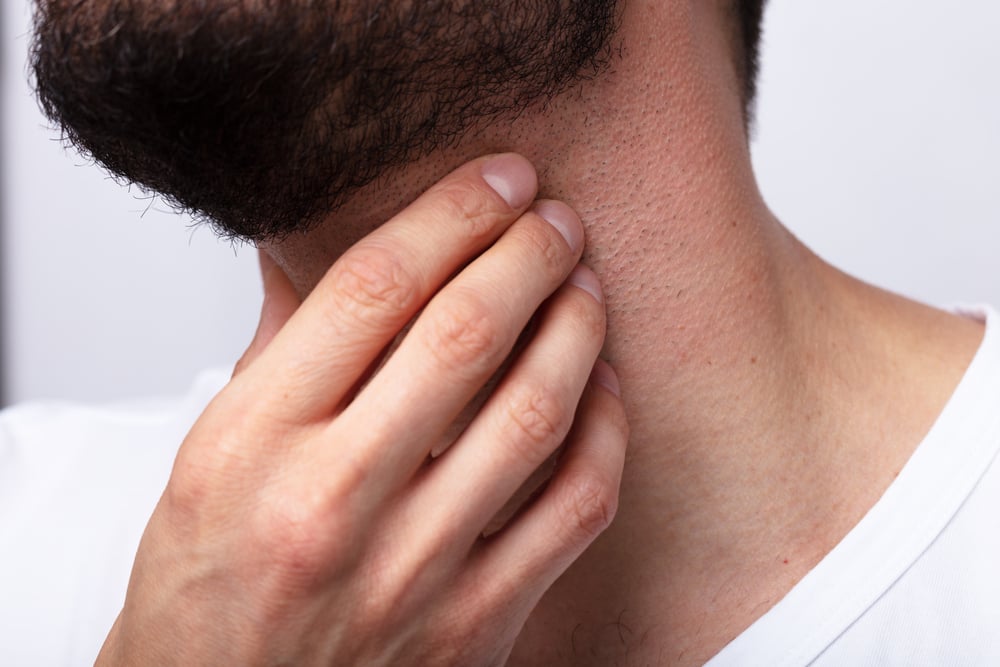At C/V ENT Surgical Group, our main goals when assessing a lump or nodule in the neck is to rule out cancer as a possibility and whether the nodule needs to be removed surgically or just monitored for changes in size. Functional evaluation of the thyroid gland is also done by sending for lab work, however if they are found, then our ENT specialists will refer you to an endocrinologist to manage those hormonal issues. We use many different tests to achieve these goals.
Physical Examination
The ENTs at our office perform physical examinations on patients. This includes palpating one’s neck and feeling for nodules or lumps and asking patients to swallow to see if the nodule moves up and down. Sometimes endoscopic evaluation of the throat is performed via the nose to look for swallowing or voice issues.
Thyroid Function Tests
Thyroid function tests measure the thyroid-stimulating hormone (TSH) in the blood. This hormone is produced by the thyroid gland and the amount of it can indicate hyperthyroidism or hypothyroidism. These issues can cause weight gain or weight loss, temperature instability, sleep issues, palpitations, fatigue and various other issues. If your thyroid function is abnormal, then your ENT specialist will refer you to an endocrinologist to manage that definitively.
Ultrasound
High-frequency sound waves produce an image of the thyroid gland. This can show the shape and structure of thyroid nodules. This can help ENT doctors identify the number, size, and characteristic of nodules in the thyroid. This is usually ordered by our physicians and done at an imaging center in detail at which time a report is generated for our physicians to interpret. For nodules over a certain size or certain characteristics on ultrasound, our doctors may recommend a fine-needle aspiration biopsy by a cytopathologist to rule out cancer.
Fine-Needle Aspiration (FNA) Biopsy
This biopsy can determine if the nodules are cancerous. A very fine needle is inserted into a nodule by a cytopathologist in the office under ultrasound guidance and local anesthesia to remove a sample of cells. This procedure only takes 20 minutes in the office and it is not something patients should be overly concerned about because there are minimal risks associated with it. The samples retrieved from the nodules are the evaluated by the cytopathologist under a microscope and a report generated telling your physician if the nodule is benign, suspicious or cancerous.
Nodule Management
Nodule management depends on the size and number of nodules you have and whether the needle biopsy showed if the nodule is benign, suspicious or cancerous. If benign our ENT specialist may recommend observation with annual ultrasound, but if suspicious or cancerous, then surgery may be warranted. Even if cancerous, the treatment is usually minimally invasive thyroid surgery with an over 95% cure rate in most well-differentiated thyroid cancers.
Thyroid Surgery
Our ENT surgeons may recommend surgery if the nodule is so large it makes it difficult for a patient to breathe or swallow, thus causing compressive symptoms. Large multinodular goiters that constrict the airways, esophagus, or blood vessels may also be a reason for surgery. When nodules are suspicious or cancerous because a biopsy shows they may be cancerous, surgical removal of them will make it easier to examine them better to determine if they truly are cancerous.
Treatment for Cancerous Nodules
The mainstay of treatment for cancerous thyroid nodules as identified by FNA (fine needle aspiration) is minimally invasive thyroid surgery by our expert surgeons, which include at minimum a hemithyroidectomy and at most a total thyroidectomy.
The benefits of surgery for cancerous nodules outweigh the risks, which include a 0.5 to 1% risk of permanent damage to vocal cord nerves causing hoarseness and parathyroid glands causing hypoparathyroidism. There is a very small risk or injury to other surrounding structures as well.
Some patients depending on the aggressiveness of their thyroid cancer will need postoperative radioactive iodine ablation (RAI) 4-6 weeks after surgery as arranged by their endocrinologist to kill any microscopic cancer cells that may be present in the body. Furthermore, if thyroid cancer is present lifelong thyroglobulin level checks and ultrasounds may be performed by your endocrinologist to make sure the cancer stays in remission.
Thyroid and Parathyroid Surgery Performed at C/V ENT Surgical Group
C/V ENT Surgical Group is known for having the best head and neck surgeons in Los Angeles and Thousand Oaks performing minimally invasive surgery routinely. They represent a select number of surgeons performing minimally invasive thyroidectomy and minimally invasive parathyroidectomy. These surgeries have only recently become popular and due to our surgeons having a great deal of training and experience, they’ve had the opportunity to teach other surgeons. In addition, their surgeons direct the Minimally Invasive Thyroid / Parathyroid Surgery program at West Hills Medical Center, the only center in the San Fernando and Conejo Valleys.
C/V ENT Surgical Group performs the following surgical procedures for thyroid nodules:
- Minimally Invasive Thyroid Surgery
- Minimally Invasive Parathyroid Surgery
- Hemithyroidectomy
- Total Thyroidectomy
- Thyroid Cancer Surgery
- Thyroid Goiter Surgery
- Parathyroid Exploration
- Central Neck Compartment Dissection
- Lateral Neck Compartment Dissection
For additional information about the above treatment for thyroid nodules or to schedule an appointment today.


